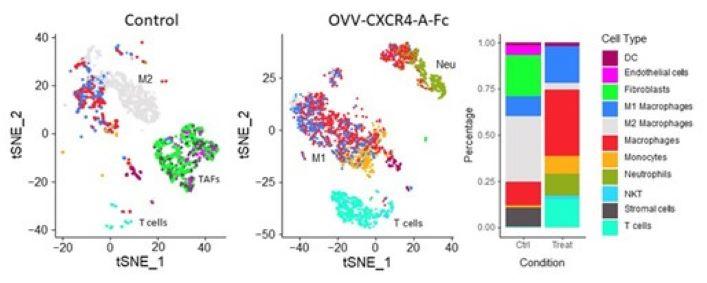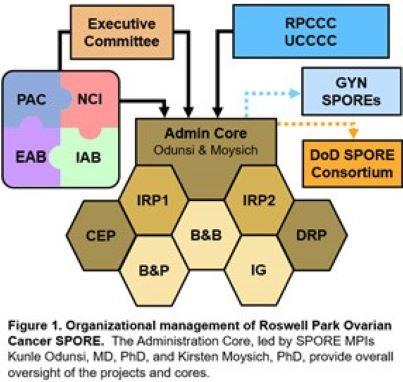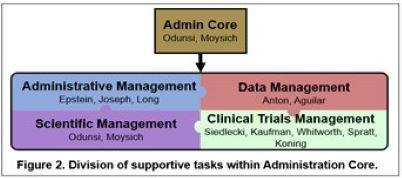Roswell Park Comprehensive Cancer Center
Principal Investigators
Kirsten Moysich, Ph.D.
Distinguished Member and Professor of Oncology
Department of Cancer Prevention and Control
Roswell Park Comprehensive Cancer Center
Elm & Carlton Streets
Buffalo, NY 14263
716-845-8004
Kunle Odunsi, M.D., Ph.D.
Director, University of Chicago Medicine Comprehensive Cancer Center
Dean for Oncology, Biological Sciences Division
University of Chicago Medicine Comprehensive Cancer Center
5841 S. Maryland Avenue, MC 1140
Chicago, IL 60637
773-702-5769
Overview
The overarching goal of the renewed Roswell Park-University of Chicago Ovarian Cancer Specialized Program of Research Excellence (SPORE) is to conduct multidisciplinary, mechanism-based, and collaborative translational research that will have the highest possible impact for women with ovarian cancer (OC). Because immunotherapies have met with only modest success in ovarian cancer patients, we continue to focus on novel strategies for generating effective anti-tumor immunity by unraveling immune-resistance mechanisms and identifying novel proteogenomic biomarkers of responsiveness. After significant planning and guidance by our Internal and External Advisory Boards and Patient Advocate Committee, we have leveraged our highly successful Developmental Research Program (DRP) and Career Enhancement Program (CEP) to propose two bi-directional translational Projects addressing basic and clinical research questions of importance in ovarian cancer.
The new Project 1 evolved as a result of a DRP award, and Project 4 developed from a CEP award. Project 1 will test an oncolytic virus armed with a CXCR4 antagonist in combination with PDL1 blockade. This treatment will abrogate tumor immune suppression and limit T-cell exhaustion in a randomized phase I/II clinical trial. Project 1 commences with a planned clinical trial.
The goal of the proposed Project 4 is to demonstrate that a six month, automated, Artificial Intelligence (AI)-driven physical activity (PA) intervention will improve body composition, fitness, metabolic health and quality of life in OC patients. This may lead to new translational knowledge about targeted lifestyle interventions that could be harnessed ancillary to chemotherapy to improve cancer outcomes in a highly fatal disease with no previously established modifiable lifestyle prognostic factors.
Furthermore, by developing and validating an AI-driven model to predict OC outcomes, we hope to vastly improve risk stratification and decision support in OC. This could ultimately enable more effective personalized care. The program also continues to expand opportunities for new avenues of ovarian cancer translational research via its successful DRP and CEP.
The four highly integrated, interconnected shared resource cores — Administration, Biospecimen & Pathology, Biostatistics & Bioinformatics, and Immunogenomics — bring innovative technology and resources to the SPORE and do not duplicate pre-existing shared resources available at Roswell Park or the University of Chicago. This application is strongly supported by over $3.6M of institutional commitment to ensure success in its goal of conducting highly innovative translational research that changes the clinical practice paradigm in ovarian cancer.
Project 1: Reprogramming the immunosuppressive ovarian tumor microenvironment (TME) with oncolytic virus (OV) and a CXCR4 antagonist
Project Co-Leaders
- Kunle Odunsi, M.D., Ph.D. (Clinical Co-Leader)
- Danuta Kozbor, Ph.D. (Basic Co-Leader)
The goal of our studies is to generate efficacious tumor-specific T cell responses in patients with chemotherapy-resistant high-grade serous ovarian cancer (HGSOC). Key stumbling blocks underpinning immunotherapy resistance against HGSOC include: (i) insufficient expansion of tumor antigen-specific T cells, (ii) recruitment of T regulatory and myeloid-derived suppressor cells via tumor CXCL12 production, (iii) exhaustion of tumor-infiltrating T lymphocytes (TILs) associated with upregulation of PD1, (iv) low tumor immunogenicity due to reduced mutation load and IFNβ production, (v) insufficient recruitment of intratumoral dendritic cells, and (vi) disorganized tumor vasculature incapable of supporting TIL trafficking. Herein, we propose to target these immune resistance mechanisms using an innovative, clinically translatable viral oncotherapy combination for effective direct oncolysis and reprogramming antitumor immunity.
The scientific premise of this project stems from our discovery that blockade of the CXCL12 chemokine/CXCR4 receptor axis in chemotherapy-resistant ovarian cancer by intraperitoneal delivery of an oncolytic vaccinia virus expressing a CXCR4 antagonist (OVV-CXCR4-A-Fc) in combination with liposomal doxorubicin yields a significant therapeutic impact. It does this by reversing the immunosuppressive tumor microenvironment (TME) and stimulating vigorous T cell responses. Our proposed mechanistic studies, to be conducted in a phase I/II clinical trial, will test the hypothesis that, in patients receiving liposomal doxorubicin for platinum-resistant/refractory HGSOC, in vivo tumor destruction by OVV-CXCR4-A-Fc will provide clinical benefit by (i) abrogating tumor immune suppression, (ii) promoting the accumulation of TILs, and (iii) when combined with PDL1 blockade, limiting T cell exhaustion. The approach is to first determine whether intraperitoneal OVV-CXCR4-A-Fc safely transforms the ovarian TME from tolerogenic to immunogenic in a first-in-human clinical trial in patients with platinum-resistant/refractory HGSOC. Second, we will establish whether OVV-CXCR4-A-Fc combined with anti-PDL1 antibody treatment is safe and clinically efficacious. Third, we will test whether the combinatorial regimen generates functionally distinct tumor-specific CD8+ and CD4+ effector/memory cells. Finally, we plan to uncover the molecular mechanisms by which OVV-CXCR4-A-Fc overcomes the ovarian tumor "vascular checkpoint" to enhance T cell migration and trafficking.
Project 4: Enhancing Personalized Care in Ovarian Cancer Through Prospective Exercise Interventions and AI-Driven Data Integration.
Project Co-Leaders
- Kirsten Moysich, Ph.D. (Basic co-leader)
- Emese Zsiros, M.D., Ph.D. (Clinical co-leader)
- Rikki Cannioto, Ph.D. (Basic co-leader)
Exercise has been shown to improve outcomes in ovarian cancer (OC) patients by improving muscle mass, fat composition, gut microbiome diversity, and anti-cancer responses. However, understanding how to effectively use exercise or physical activity (PA) and other behavioral approaches that may improve OC outcomes is lacking. Previous studies evaluating PA in cancer patients relied on self-reported questionnaires, leading to reporting biases and the need for reliable tools. We have previously demonstrated the feasibility of using Fitbit tracking devices in 27 OC patients, successfully integrating their data into the Electronic Health Record (EHR). Our prior work has shown that these devices can reliably track PA, heart rate variability, and sleep patterns. This has resulted in valuable insights into patients' daily routines. In addition, self-reported PA and sleep in OC showed little correlation with objective real-time tracking quality of life (QoL) factors. This emphasizes the importance of collecting these data and providing behavioral modifications to improve sleep and reduce a sedentary lifestyle.
We aim to build on these studies by collecting additional data to create artificial intelligence (AI)-driven predictive models that will enhance our understanding of patient outcomes and guide personalized treatment strategies. We also hope to create a PA intervention that may impact various factors such as muscle mass, fat composition, physical functioning, and QoL.
We propose a prospective, randomized clinical trial for 60 newly diagnosed or recurrent OC patients with evidence of disease. These patients will be randomized to a PA intervention arm where patients will be randomized to receive AI-generated prompts to exercise >150 minutes/week or to a control arm with initial PA counseling only (Specific Aim 1). Metabolic health will also be measured using a continuous glucose monitor (CGM). We will also gather social and psychological factors indicative of wellness. These metabolic measures, combined with EHRs and advanced AI data integration, will test the benefits of a PA intervention and identify predictors of improved outcomes. Our AI-validated algorithm, correlated with OC patient overall survival and segments CT scans, will be used to calculate body fat and muscle compositions. These analyzed scans, along with additional QoL and resiliency questionnaires, will also be incorporated (Specific Aim 2).
Our hypothesis is that increased PA will lead to meaningful changes in body composition and improved mobility and QoL, ultimately leading to better survival outcomes. We also hypothesize that data collected from CGMs will provide valuable information about a patient's metabolic health (daily glucose trends, variability, time in range). Integrating these diverse data sources using AI-driven methodology, including activity trackers, CGMs, advanced imaging analysis, and social and psychological factors, will allow us to create robust predictive models. These models will include digital twin models, to enhance our understanding of patient outcomes and guide personalized treatment strategies (Specific Aim 3).
Administration Core
Core Co-Directors
The overall objective of the Roswell Park-University of Chicago Ovarian Cancer SPORE Administration Core is to provide leadership, direction, and scientific and fiscal oversight. The Core provides administrative services to enhance research productivity and maintain a stimulating research environment conducive to translational research in ovarian cancer. The Administration Core will catalyze, oversee, and support interactions among SPORE components, external and internal collaborators, other SPOREs, patient advocates, and the National Cancer Institute. In order to achieve the overall objective of managing SPORE resources and maintaining high quality in all components, the Administration Core will be organized into four main operational areas:
- Leadership;
- Administrative Management;
- Clinical Trials, Data, and Communications Management; and
- Scientific Management.
Management and support are accomplished through an organizational framework that takes advantage of highly experienced leadership that is integrated within Roswell Park Comprehensive Cancer Center and the University of Chicago Comprehensive Cancer Center, an oversight executive committee for planning and evaluation of activities, and scientific and patient advocate advisors. The functions performed by the Administration Core will provide greater integration and efficiency across the program and will result in lower operating costs for each individual SPORE component.
Biostatistics and Bioinformatics Core
Core Co-Directors
The Biostatistics and Bioinformatics Core of the Roswell Park-University of Chicago Ovarian Cancer SPORE will assist basic, translational and clinical researchers of the SPORE with proper formulation, refinement and execution of study objectives. The Core will apply the appropriate biostatistics and bioinformatics analyses and provide the appropriate interpretation of their results, in terms of both strengths and limitations. We will ensure a priori that DRP and CEP projects are feasible from a biostatistical and bioinformatics perspective. The Biostatistics and Bioinformatics Core will ensure that appropriate data are collected and the data are of the highest quality and meet regulatory standards for privacy. They will also ensure that the data are those required to answer a study question, necessary for administrative reporting, needed to establish protocol compliance, and/or will be included in a manuscript. We will prepare Data Safety Monitoring Board reports and post clinical trial results to clinicaltrials.gov in a timely and compliant manner and ensure compliance to NIH policy and assist with data sharing of SPORE data via the NCI Cancer Research Data Commons infrastructure and similar NIH-designated data repositories.
Biospecimen and Pathology Core
Core Co-Directors
The Roswell Park-University of Chicago Ovarian Cancer SPORE Biospecimen and Pathology Core (BPC) combines a centralized mechanism for expert tissue handling services and performance of tissue-based assays. The staff comprises highly qualified, experienced personnel with state-of-the-art integrated informatics infrastructure. They provide tools for tracking biospecimen collection, histopathological evaluation, and clinical annotation of samples with linkage to immunogenomic and other translational data generated by the Individual Research Projects proposed in this renewal application. The Core will collect, de-identify, process, bank, and distribute annotated, high-quality tumor and blood samples from patients participating in SPORE-sponsored clinical studies. In addition, the BPC will provide investigators with specialized technical and interpretative histopathology services, including expertise in multiplexed immunohistochemistry (IHC) and imaging mass cytometry (IMC), tissue microarray construction, laser capture microdissection, and digital imaging. They will perform quantitative pathology review of slides, tumor-infiltrating lymphocytes assessment, tissue QC/QA and preparation for Next-Gen sequencing-based assays (whole exome seq, RNAseq, TCRseq, MethylSEQ), and oversight on optimal utilization of each biospecimen. The Core will also be instrumental in testing patient biospecimens to determine eligibility for clinical trials and directly add to the bi-directional translational science by a detailed immunological annotation of ovarian tumors.
Immunogenomics Core
Program Co-Directors
The objective of the Immunogenomics Core is to perform comprehensive immunophenotyping, functional analyses, genetic and epigenetic monitoring in peripheral blood (PB) and the tumor microenvironment (TME). It also aims to investigate tumor antigen-specific immune responses for the immunotherapeutic approaches being developed and tested in the Individual Research Projects (IRP) of the Roswell Park-University of Chicago Ovarian Cancer SPORE. The core will also be responsible for immunologic and genomic assays for the CEP and DRP.
The specific aims of the Immunogenomics Core are to:
- Design and optimize immunologic and genomic assays for IRPs, CEP and DRP, and provide state-of-the-art immunophenotyping, transcriptome analysis, TCR sequencing, epigenetic and functional analyses of immune cells in PB and TME treated with immunotherapy.
- Run whole-exome sequencing for tumor and PB samples to identify mutations and HLA types and confirm T-cell reactivity against the predicted neoantigens for DC-peptide vaccine in IRP2.
The Immunogenomics Core will develop new methodologies/markers and make them available to SPORE investigators. It also has a significant educational role, working with all SPORE PIs, technicians and young investigators on assay development, proper use of instrumentation, and interpretation of their data.
Developmental Research Program
Program Co-Directors
The Developmental Research Program (DRP) of the Roswell Park-University of Chicago Ovarian Cancer SPORE is a platform to support innovative, potentially high-risk/high-reward ideas with the potential to mature further into translational ovarian cancer research projects. These projects will transition basic and/or population research findings into research focused on patients or human specimens. DRP funding encourages the development of the pilot projects into collaborative, multi-investigator, multi-institutional translational research programs. It also fosters new Individual Research Projects. DRP projects are the ultimate measure of the success of a SPORE, forming the basis for future translational ovarian cancer research and providing springboards for the next generation of R01, P01, Consortium, and SPORE grants. The goals of the proposal review process are not only to identify the most exciting projects, but to provide constructive critiques that are of value both for future submission of the projects to extramural funding sources, and for identifying potential collaborators and resources within the Roswell Park-University of Chicago Ovarian Cancer SPORE. These measures increase the competitiveness of future applications. The DRP’s strength lies in its ability to respond rapidly to new initiatives and provide significant, timely financial support to high-risk/pilot projects.
Career Enhancement Program
Program Co-Directors
The purpose of the Career Enhancement Program (CEP) of the Roswell Park-University of Chicago Ovarian Cancer SPORE is to support the career development of junior researchers in translational ovarian cancer research. The target population for the program is outstanding entry-level (e.g., Assistant Professor) scientific and clinical faculty. In some cases, the CEP may include senior postdoctoral or clinical fellows with exceptional potential for independent research careers. The CEP will be supported by both SPORE funds and matching institutional funds from Roswell Park, the University of Chicago, and the University of Rochester. The CEP serves as a structured mechanism for identifying outstanding candidates through an open and competitive application and review process and matching the resulting awardees with experienced mentors. CEP awardees are afforded full access to the Roswell Park-University of Chicago Ovarian Cancer SPORE Core resources, including tissue specimens and statistical support. The CEP provides a vital mechanism for the development of the next generation of translational ovarian cancer researchers.




